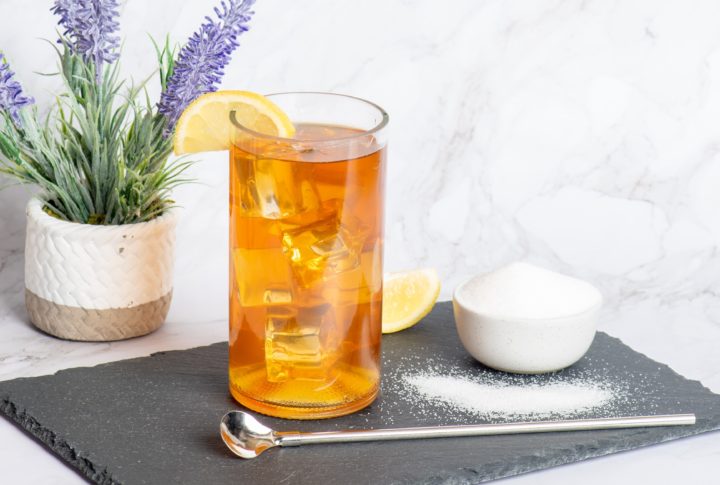The glycemic index chart for sweeteners In supplements explains the different carbohydrates that are used to sweeten foods. When it comes to supplementation for the health and fitness industry, it is fair to say there has historically been plenty of debate regarding the role played by artificial sweeteners.
Several different carbohydrates are used to sweeten foods including sucrose, fructose, maltose, glucose, and maltodextrin. Some of these are naturally occurring, while others are available in highly processed formulations such as high fructose corn syrup. Understanding which sweeteners can be used safely can be tricky, but thankfully there is a list we can use to resolve much of the confusion.
the Glycemic Index CHART
In simple terms, the Glycemic Index (GI) ranks foods based on how much impact they will have on your blood sugar levels.
The GI of sweeteners is a function of the type and quantity of their carbohydrate content as well as the presence of other substances that can slow absorption.
During intense workouts your body quickly burns off stored energy and turns to glycosis – the process by which carbohydrates are converted into energy.
This is why athletes load up on carbohydrates before working out, to ensure their body has the fuel to cope with the physical demands of exercising.
Before we delve deeper into the benefits the Glycemic Index chart has from a health and fitness perspective, let’s look at how it ranks sweeteners.
| Glycemic Index | Sweetener | Type |
| 0 | Brazzein | Natural Sweetener |
| 0 | Curculin | Natural Sweetener |
| 0 | Glycyrrhizin | Natural Sweetener |
| 0 | Luo Han Guo | Natural Sweetener |
| 0 | Miraculin | Natural Sweetener |
| 0 | Monellin | Natural Sweetener |
| 0 | Pentadin | Natural Sweetener |
| 0 | Stevia | Natural Sweetener |
| 0 | Thaumatin | Natural Sweetener |
| 0 | Acesulfame K | Artificial Sweetener |
| 0 | Alitame | Artificial Sweetener |
| 0 | Aspartame | Artificial Sweetener |
| 0 | Cyclamate | Artificial Sweetener |
| 0 | Neotame | Artificial Sweetener |
| 0 | Saccharin | Artificial Sweetener |
| 0 | Sucralose | Artificial Sweetener |
| 1 | Erythritol | Sugar Alcohol |
| 1 | Yacon Syrup | Natural Sweetener |
| 1 | Oligofructose | Sugar Fibre |
| 1 | Inulin | Sugar Fibre |
| 2 | Isomalt | Sugar Alcohol |
| 2 | Mannitol | Sugar Alcohol |
| 3 | Lactitol | Sugar Alcohol |
| 4 | Sorbitol | Sugar Alcohol |
| 5 | Glycerol | Sugar Alcohol |
| 12 | Xylitol | Sugar Alcohol |
| 15 | Agave Syrup | Modified Sugar |
| 25 | Brown Rice Syrup | Modified Sugar |
| 25 | Fructose | Sugar |
| 25 | Galactose | Sugar |
| 31 | HFCS-90 | Modified Sugar |
| 35 | HSH | Sugar Alcohol |
| 35 | Coconut Palm Sugar | Natural Sugar |
| 35 | Maltitol | Sugar Alcohol |
| 42 | Barley Malt Syrup | Modified Sugar |
| 43 | Cane Juice | Sugar Extract |
| 45 | Lactose | Sugar |
| 50 | Honey | Natural Sugar |
| 50 | Sorghum Syrup | Natural Sugar |
| 54 | Maple Syrup | Natural Sugar |
| 55 | Blackstrap Molasses | Sugar Extract |
| 58 | HFCS-55 | Modified Sugar |
| 60 | Caramel | Modified Sugar |
| 60 | Golden Syrup | Modified Sugar |
| 60 | Inverted Sugar | Modified Sugar |
| 60 | Refiners Syrup | Modified Sugar |
| 65 | Sucrose | Sugar |
| 68 | HFCS-42 | Modified Sugar |
| 70 | Trehalose | Sugar |
| 100 | Dextrose | Sugar |
| 100 | Glucose | Sugar |
| 105 | Maltose | Sugar |
| 110 | Maltodextrin | Sugar |

Assessing Major Sweeteners
To further understand the impact of sweeteners on health and fitness, we assess some of the major ones worth noting on the GI list.
Stevia
Stevia is a natural sweetener that comes from the Stevia rebaudiana plant. It is up to 300 times sweeter than sucrose, calorie-free, and does not raise blood sugar levels.
Not everyone likes how it tastes, which often means it is blended with other sweeteners to negate the bitter aftertaste. This can reduce or negate the nutritional benefit of pure stevia.
The United States Food and Drug Administration (FDA) has classified sweeteners made from high-purity steviol glycosides to be ‘generally recognised as safe’.
The acceptable daily intake (ADI) of stevia is four milligrams per kilogram (mg/kg) of a person’s body weight, so always check the label on supplements to stick within the guidelines.
Sucralose
Sucralose is an artificial sweetener made from sucrose. It is up to 600 times sweeter than table sugar but contains very few calories.
It is one of the most commonly used artificial sweeteners and is added to a wide range of products including baked goods, chewing gum and workout supplements.
The FDA has approved sucralose as a general-purpose sweetener and set an ADI of 5 mg/kg of body weight. However, research into its use in health and fitness products is conflicting.
One noteworthy side effect of regular consumption of sucralose is it can have a hugely negative impact on the good bacteria contained in the human gut.
Aspartame
Aspartame is a low-calorie artificial sweetener that does not contain natural sugars or any calories if used in small amounts.
It has been widely tested by government-funded and independent laboratories, but there are several question marks regarding its safety.
As with many other artificial sweeteners, there is plenty of contradictory research about the use of aspartame in fitness supplements.
However, a study conducted at Yale University in 2020 discovered that aspartame can contribute to weight loss providing it is not combined with other fats or carbohydrates.
Erythritol
Erythritol is a type of carbohydrate called sugar alcohol that is used as a sugar substitute. It is naturally found in some fruits, vegetables and fermented foods.
Regardless of the source, it is a zero-calorie sweetener, making it different from other sugar alcohols or refined sugar.
It is up to 80 percent as sweet as sugar but can technically be classified as natural. As it is not absorbed in the bloodstream, it does not cause blood sugar spikes.
While there are no official guidelines on using erythritol, most people can handle the consumption of one gram for every kilogram of body weight daily.
Fructose
Climbing further up the GI rankings we find fructose, which some manufacturers add to fitness supplements to make them taste better.
However, the presence of fructose in supplementary products can completely negate their benefits from a health and fitness perspective.
Fructose cannot be directly used by the cells for energy – it will actually be converted by the liver into fat, which ultimately defeats the object of a workout.
If fructose is present in your fitness supplements it can stop you from building up your muscle, thus wasting the time and effort you put into your exercise.
Maltodextrin
At the top of the GI list is maltodextrin – a highly-processed powder made from corn, rice, wheat or potato starch.
Maltodextrin can cause a significant spike in your blood sugar, meaning that athletes who have diabetes should tread particularly carefully regarding its use.
Another reason to limit maltodextrin is to keep your gut bacteria healthy, with studies showing it suppresses the growth of probiotics in your digestive system.
Although the levels of sugar in maltodextrin can lead to weight gain, it has been shown to help maintain anaerobic power during exercise.

Sweeteners & Fitness Supplements
Debates about sugar versus artificial sweeteners have rumbled on for the past few decades and will continue to do so for many years to come. Conflicting research results on the merits of sweeteners have provided little clarity, especially regarding their use in fitness supplements. Generally speaking, artificial sweeteners are viewed as an easy solution in the fat loss process and keeping weight off in the future. However, they cannot be broken down in the same ways as natural sugars, so they offer no energy benefits or in the processes of protein synthesis and recovery.
Some may even reduce blood glucose levels, thus impacting the maintenance of those levels. This can have a negative effect on performance and cognitive function. Artificial sweeteners may also impair your sensitivity to hunger signals, which could promote increased food intake and have an adverse effect on weight loss. There are numerous other issues associated with the regular intake of artificial sweeteners that must be considered when supplementing. Headaches, dizziness, stomach cramps and several other side effects have all been noted, but they pale into insignificance when compared to the main problem.
Recent studies have reported there may be a strong link between sweetener use and a hindrance in our ability to process real sugars. This potentially increases the risk of Type 2 diabetes, which is rising in many jurisdictions including the United States. It has also been suggested that the use of artificial sweeteners leaves people craving more sweet products, thus negating the impact of exercise.
Despite this, when it comes to considering the ingredients in fitness supplements, it is clear that low-glycemic sweeteners are the way to go. While research is still being done and the results are often inconsistent, natural sweeteners are more beneficial than maltodextrin and others near the top of the GI list. Although some studies question whether products such as stevia can be trusted as a calorie-free substitute, it is important to remember that natural is always the best.
When you buy any health and fitness supplements, always use brands that openly list all of the ingredients they contain. This applies whether you are looking for pre-workout, intra-workout or post-workout benefits or simply searching for a general pick-me-up during the day. Pay close attention to the supplement ingredients for the impact on blood sugar before buying, as this has a direct effect on weight loss and body composition goals.
RELATED POSTS:
- How Much Sucralose Is Safe?
- 50 Interesting Facts About Pre-Workout
- The Big Business Of Supplements
- 50 Interesting Facts About Supplements
- 50 Statistics About Pre-Workout
